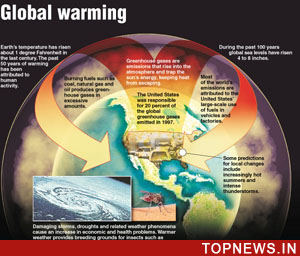An international team of scientists has tried a new approach to addressing the complex argument about the costs of climate change – and, once again, the prediction is that the costs of inaction will be so much greater than paying the bills now.
The researchers − from the UK, Switzerland and the US − conclude that policy-makers must apply the brakes and put a high price on carbon emissions “before it is too late”.
Much of the argument on this issue revolves around the perceived cost of carbon emissions and any tax that should be imposed on fossil fuel use. Social scientists and economists and climate modellers have tried a number of approaches.
One group tried to work out the interval between the burning of fossil fuels and the consequent greenhouse warming, and concluded it could be as little as 10 years.
Other groups have separately tried to calculate the true cost of emitted carbon dioxide. The US government works on the basis of $37 in social costs per tonne emitted, but two US scientists proposed that the true cost in future health and habitat losses was probably six times higher.
And yet another researcher began to examine the costs of petrol, or coal, or methane gas if the long-term economic damage and health costs were factored in, and concluded that these made “expensive” renewables cheap by comparison.
Now researchers from the universities of Exeter in the UK, Zurich in Switzerland and Chicago and Stanford in the US report in Nature Climate Change that they considered the risk that emitted greenhouse gases from fossil fuels would push the planetary climate system closer to what climate scientists call “tipping points.”

